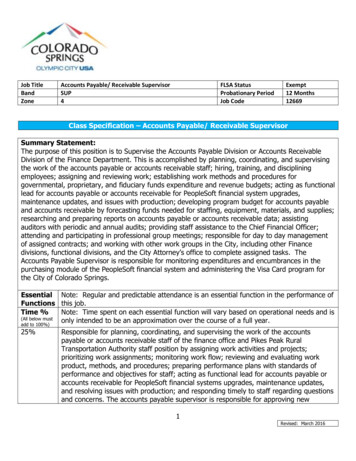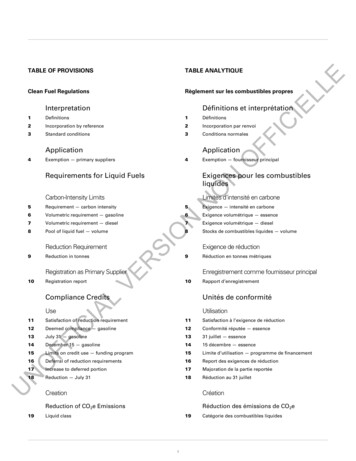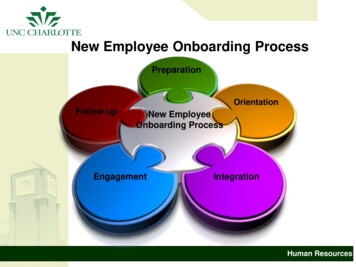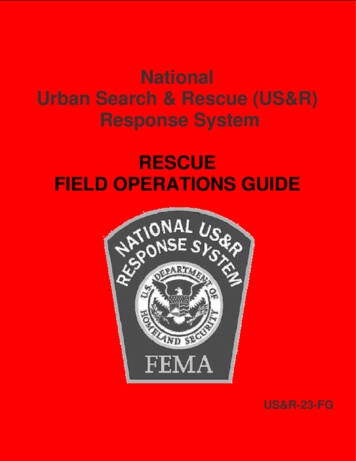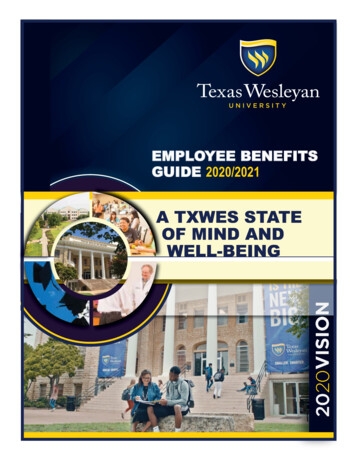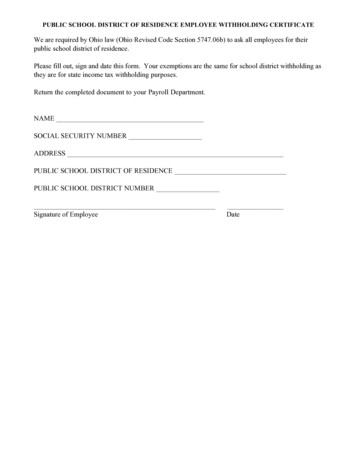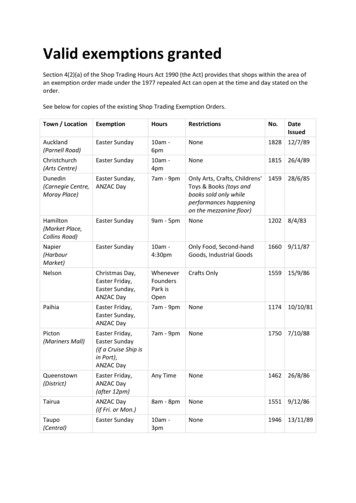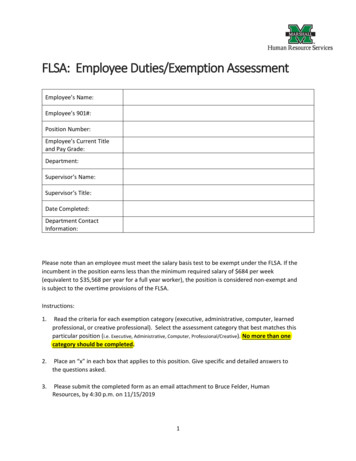
Transcription
FLSA: Employee Duties/Exemption AssessmentEmployee’s Name:Employee’s 901#:Position Number:Employee’s Current Titleand Pay Grade:Department:Supervisor’s Name:Supervisor’s Title:Date Completed:Department ContactInformation:Please note than an employee must meet the salary basis test to be exempt under the FLSA. If theincumbent in the position earns less than the minimum required salary of 684 per week(equivalent to 35,568 per year for a full year worker), the position is considered non-exempt andis subject to the overtime provisions of the FLSA.Instructions:1.Read the criteria for each exemption category (executive, administrative, computer, learnedprofessional, or creative professional). Select the assessment category that best matches thisparticular position (i.e. Executive, Administrative, Computer, Professional/Creative). No more than onecategory should be completed.2.Place an “x” in each box that applies to this position. Give specific and detailed answers tothe questions asked.3.Please submit the completed form as an email attachment to Bruce Felder, HumanResources, by 4:30 p.m. on 11/15/20191
Executive Employee ExemptionExempt executive employees generally are responsible for the success or failure of businessoperations under their management. Other critical elements are (1) whether management is theemployee’s primary duty, (2) whether the employee directs the work of two or more full-timeequivalent employees, and (3) whether the employee has the authority to hire/fire otheremployees or, alternatively, whether the employee’s suggestions and recommendations as to thehiring, firing, advancement, promotion or other change of status of other employees are givenparticular weight.YESIs the incumbent compensated on a salary basis at a rate not less than 684per week? If not, do you have VP approval and does your budget allow forincumbent’s salary to be increased to 35,568?Does the incumbent’s primary duty consist of managing a recognizeddepartment or division of the university? If yes, please describe:Does the incumbent regularly supervise two or more employees who areemployed in the department?Does the incumbent interview, select and train employees? Coach employeesin proper job performance techniques and procedures?Does the incumbent complete performance evaluations?Does the incumbent handle employee complaints and grievances anddiscipline employees when necessary?Does the incumbent plan other employees’ work and determine thetechniques used in their work?Does the incumbent distribute work among different employees?Does the incumbent determine the types of materials, supplies, or tools to beused by other employees? Control the flow and distribution of materials andsupplies?Does the incumbent provide for the safety of employees and the property ofthe employer?Does the incumbent control a budget? If yes, please explain:2NOIf no,stop here– noneed toproceed.
Does the incumbent monitor or implement legal compliance measures?Does the incumbent have the authority to hire or fire other employees?If no, is it part of the incumbent’s job to make recommendations on hiring,firing, advancement or other change of status?Are the incumbent’s recommendations frequently relied upon?What percent of working time does the incumbent spend providing theleadership duties and responsibilities described above?%List the employees that incumbent supervises and whose performance is evaluated byincumbent.NameTitle3FTE
Administrative Employee ExemptionThe duties portion of the administrative exemption test establishes a two-part inquiry fordetermining whether an employee performs exempt administrative duties. First, what type ofwork is performed by the employee? Is the primary duty the performance of work directlyrelated to management or general business operations? Second, what is the level or nature ofthe work performed? Does the employee’s primary duty include the exercise of discretion andindependent judgment with respects to matters of significance? All of the relevant factors mustbe considered when determining whether an employee in an administrative position is exempt.YESIs the incumbent compensated on a salary basis at a rate not less than 684 per week? If not, do you have VP approval and does your budgetallow for incumbent’s salary to be increased to 35,568?Please describe the incumbent’s primary duty:Is this primary duty directly related to the management or general businessoperations of Marshall University or its customers?Does the incumbent’s primary duty require the exercise of discretion andindependent judgment with respect to matters of significance? If yes, does theemployee:(a) Have authority to formulate, affect, interpret, or implementmanagement policies or operating practices? If yes, please provide anexample:4NOIf no,stop here– noneed toproceed.
(b) Carry out major assignments in conducting the operations of theuniversity? If yes, please provide an example:(c) Perform work that affects business operations to a substantialdegree? If yes, please provide an example:(d) Have the authority to waive or deviate from established policies andprocedures without prior approval? If yes, please provide an example:(e) Provide consultation or expert advice to management?(f) Have authority to negotiate and bind the university on significantmatters? If yes, please provide an example:(g) Have involvement in planning long or short-term business objectives?(h) Investigate and resolve matters of significance on behalf ofmanagement? If yes, please provide an example:5
Computer Employee ExemptionAn employee who meets the consolidated duties test for computer professionals will beexempt if he or she meets either the salary or fee basis test or is paid at least 18.24per hour. To qualify as an exempt computer employee, a worker must have a primaryduty that consists of the four duties described under #3 below. The primary dutyrequirement applies both to salaried and hourly computer employees.YESIs the incumbent compensated on either a salary basis of 684 per week, orcompensated on an hourly basis, at a rate not less than 18.24 per hour? Ifnot, do you have VP approval and does your budget allow for incumbent’ssalary to be increased to 35,568?Is the incumbent employed as a computer systems analyst, computerprogrammer, software engineer, or other similarly skilled worker in thecomputer field? If yes, please describe the incumbent’s primary duty:Does the incumbent’s primary duty consist of:a) The application of systems analysis techniques and procedures, includingconsulting with users to determine hardware, software, or systemfunctional specifications? If yes, please give an example:b) The design, development, documentation, analysis, creation, testing, ormodification of computer systems or programs, including prototypes,based on and related to user or system design specifications? If yes,please give an example:6NOIf no,stop here– noneed toproceed.
c) The design, documentation, testing, creation, or modification ofcomputer programs related to user or system design specifications? Ifyes, please give an example:d) A combination of the aforementioned duties, the performance of whichrequires the same level of skills? If yes, please give an example:7
Professional Employee ExemptionThe professional exemption actually encompasses two exemptions, one for learned professionalsand one for creative professionals. To be an exempt learned professional, an employee must havea primary duty that is the performance of work requiring knowledge of an advanced type,including the consistent exercise of discretion and judgment in a field of science or learning wherethe advanced knowledge is acquired by a prolonged course of specialized intellectual instruction(examples include lawyers, doctors, architects, teachers, etc.) To meet the test for the creativeprofessional exemption, an employee must have a primary duty that involves the performance ofwork requiring invention, imagination, originality or talent in a recognized field of artistic orcreative endeavor (examples include actors, musicians, novelists, etc.).Learned Professional EmployeeYESIs the incumbent compensated on a salary basis at a rate not less than 684 per week? If not, do you have VP approval and does your budgetallow for incumbent’s salary to be increased to 35,568?Please describe the incumbent’s primary duty:(a) Does the incumbent’s primary duty involve the performance of workrequiring advanced knowledge in a field of science or learning that iscustomarily acquired by a prolonged course of specialized intellectualinstruction?(b) Is the incumbent’s primary duty predominantly intellectual incharacter? If yes, please describe:(c) Does the incumbent’s primary duty require that his or her advancedknowledge be used to analyze, interpret, or make deductions fromvarying facts or circumstances? If yes, please give an example:8NOIf no,stop here– noneed toproceed.
(d) Does the incumbent’s primary duty include the consistent exercise ofdiscretion and judgment? If yes, please give an example:9
Creative Professional ExemptionYESIs the incumbent compensated on a salary basis at a rate not less than 684 per week? If not, do you have VP approval and does your budgetallow for incumbent’s salary to be increased to 35,568?Please describe the incumbent’s primary duty:Does the incumbent’s primary duty involve the performance of work requiringinvention, imagination, originality, or talent in a recognized field of artistic orcreative endeavor? If yes, please give an example:For HR Use OnlyRelevant exemptiontest:Exempt statusdetermination:Date finalized:Class/CompensationAnalyst10NOIf no,stop here– noneed toproceed.
FLSA: Employee Duties/Exemption Assessment Employee's Name: Employee's 901#: Position Number: Employee's Current Title and Pay Grade: Department: Supervisor's Name: Supervisor's Title: Date Completed: Department Contact Information: Please note than an employee must meet the salary basis test to be exempt under the FLSA. If the

